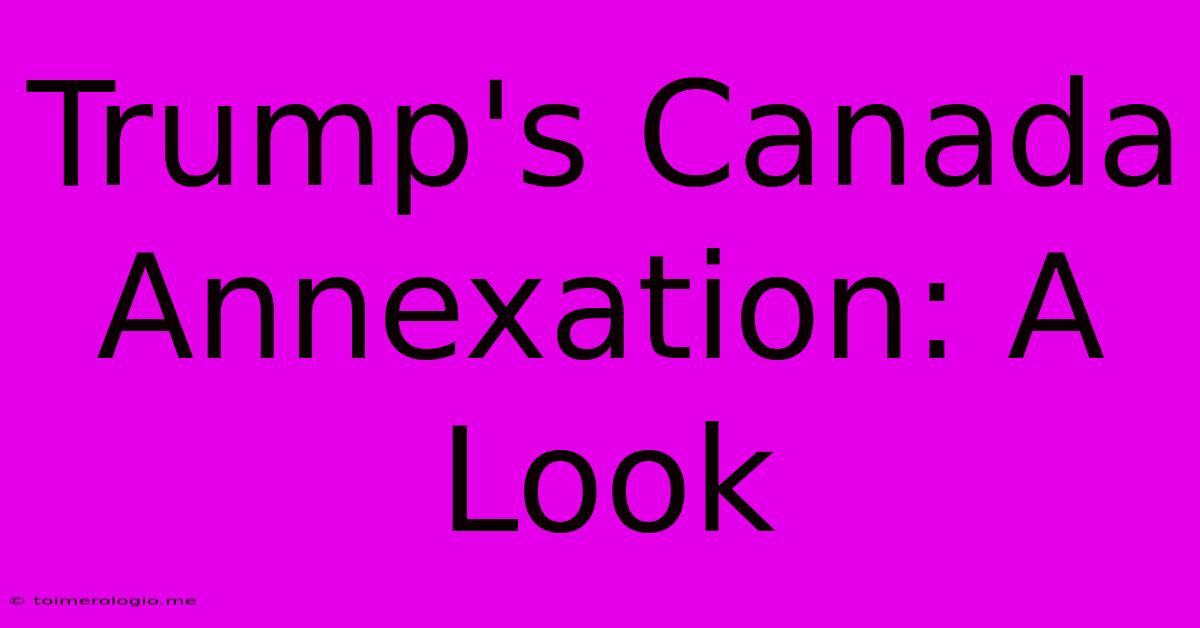Trump's Canada Annexation: A Look

Discover more detailed and exciting information on our website. Click the link below to start your adventure: Visit Best Website toimerologio.me. Don't miss out!
Table of Contents
Trump's Canada Annexation: A Look at the Rhetoric and Reality
Donald Trump's presidency was marked by numerous controversial statements and policies. Among them, his pronouncements regarding Canada, often bordering on annexationist rhetoric, sparked significant debate and concern. This article delves into the nature of Trump's statements about Canada, analyzing the context, implications, and the stark contrast between his rhetoric and the realities of Canada-US relations.
The "Nationalist" Rhetoric: More Trade, Less Sovereignty?
Throughout his campaign and presidency, Trump frequently criticized the North American Free Trade Agreement (NAFTA), characterizing it as detrimental to American interests. He repeatedly threatened to renegotiate or withdraw entirely from NAFTA, leveraging this as a tool to pressure Canada and Mexico into accepting terms more favorable to the United States. This aggressive negotiating tactic, often framed within a broader "America First" nationalist agenda, fueled speculation about a potential shift in the US-Canada relationship.
Beyond NAFTA: Hints of Annexation?
While Trump never explicitly called for the annexation of Canada, his rhetoric often bordered on the provocative. His criticisms of Canada’s trade practices, coupled with his emphasis on American strength and dominance, led many to interpret his actions as veiled threats. Comments about Canada "taking advantage" of the United States economically, along with his general disdain for international agreements, contributed to this perception.
The lack of direct calls for annexation might be attributed to several factors. The sheer logistical and political complexities of such a move would be immense, requiring a massive shift in domestic and international relations. Furthermore, openly advocating for annexation would likely be met with strong opposition not only from Canada but also from significant portions of the American public and the international community.
Analyzing the Economic Underpinnings
Trump's focus on economic issues was central to his approach towards Canada. His concerns about the trade deficit and what he perceived as unfair trade practices fueled his aggressive stance. The close economic integration between the two countries, however, makes a simplistic narrative of exploitation highly problematic.
The Complexities of US-Canada Trade
The US-Canada trade relationship is exceptionally intricate and mutually beneficial. Numerous supply chains are deeply intertwined, with goods and services regularly crossing the border. Significant portions of both economies are dependent on this integrated relationship. Any attempt to fundamentally alter this would have profound and potentially devastating consequences for both countries.
Beyond the Trade Deficit: A Deeper Look
Trump's frequent mention of a trade deficit with Canada overlooks the complexities of bilateral trade. A trade deficit doesn't necessarily equate to exploitation. It often reflects differences in production, consumption patterns, and investment flows. Focusing solely on the deficit ignores the vast mutual benefits of the economic exchange.
Geopolitical Implications and International Relations
The potential for US attempts to exert pressure on Canada extends beyond economic considerations. Canada's role in international affairs, particularly its close ties with the US and its participation in various multilateral organizations, introduces a geopolitical dimension to Trump's rhetoric.
Canada's Strategic Importance
Canada's geographical location and its close alliance with the US make it strategically important. Any significant disruption of the US-Canada relationship would have wide-ranging geopolitical consequences, potentially affecting regional stability and North American security.
International Response to Trump's Approach
Trump's aggressive tactics towards Canada were met with varying responses from the international community. While some expressed concern, others saw it as part of a broader trend of rising nationalism and protectionism. Canada itself adopted a measured approach, seeking to maintain a stable relationship while also pushing back against overly aggressive US demands.
The Reality Check: Why Annexation Was Unlikely
Despite the provocative rhetoric, the likelihood of Trump actually attempting to annex Canada was always incredibly low. The legal, political, and practical hurdles were insurmountable.
Constitutional and Legal Barriers
The US Constitution provides no mechanism for the annexation of another country without its consent. Moreover, Canadian law and public opinion would strongly oppose any such action.
Political Feasibility: Domestic and International Opposition
Annexing Canada would face overwhelming opposition within the United States. The potential for social unrest and political backlash would be significant. Internationally, such a move would likely trigger severe condemnation and potentially trigger significant economic and diplomatic repercussions.
The Economic Fallout
As discussed earlier, the close economic integration between the US and Canada renders annexation an economically disastrous prospect. Disrupting the deeply intertwined trade relationship would have a negative impact on both economies.
Conclusion: Rhetoric vs. Reality
Donald Trump's rhetoric regarding Canada, while often alarming, should be viewed within the context of his broader political agenda. While his aggressive negotiating tactics and criticisms of trade relationships raised concerns, the practical reality of annexing Canada was always extremely remote. His statements, while ultimately not resulting in any significant territorial changes, served to highlight the complexities and challenges within the US-Canada relationship and underscored the fragility of international cooperation in an era of rising nationalism. The relationship continues to evolve, requiring careful navigation to maintain the economic and strategic benefits of this vital partnership.

Thank you for visiting our website wich cover about Trump's Canada Annexation: A Look. We hope the information provided has been useful to you. Feel free to contact us if you have any questions or need further assistance. See you next time and dont miss to bookmark.
Also read the following articles
| Article Title | Date |
|---|---|
| Nfl Playoffs 2025 Schedule And Bracket | Jan 12, 2025 |
| 2025 Nfl Playoff Bracket And Schedule | Jan 12, 2025 |
| Nfl Playoffs Wild Card Games Bracket | Jan 12, 2025 |
| Wild Card Games Nfl 2025 Schedule | Jan 12, 2025 |
| 2025 Nfl Wild Card Playoff Schedule | Jan 12, 2025 |
